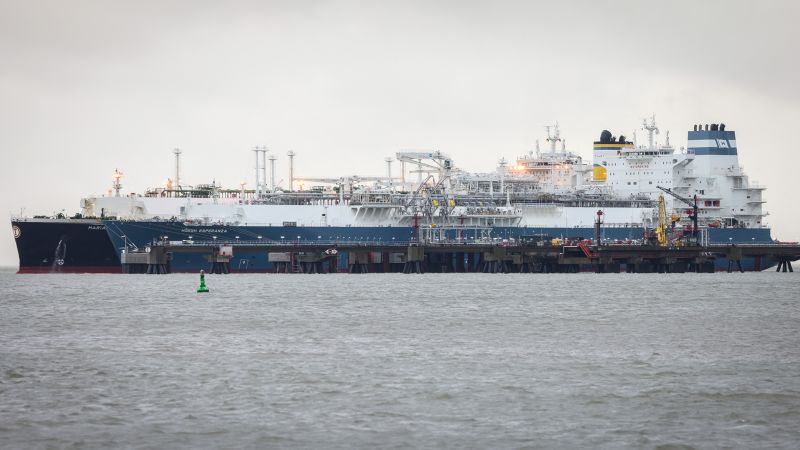WOODSTOCK, England — The setting was a super-posh country estate, the birthplace of Winston Churchill, just outside Oxford. Forty-six leaders from Europe showed up. The word of the day was “reset” — as in Britain seeks to reset its relationship with the continent.
World
New U.K. prime minister seeks reset with Europe after years of squabbling

Starmer, who was against Brexit, has emphatically stated that Britain won’t be rejoining the E.U. in his lifetime. But he used Thursday’s already scheduled summit to begin patching things up after years of squabbling over the terms of the U.K. exit.
In his opening speech at Blenheim Palace, Starmer told the gathering, “We want to work with all of you to reset relationships, rediscover our common interest and renew the bonds of trust and friendship that brighten the fabric of European life.”
At his closing news conference, Starmer said, “I’m proud to leave this summit with stronger relationships across Europe.”
That may be overstating what was accomplished in a day of photo ops, breakout sessions and bilateral meetings that resembled speed dating. But Starmer got some points for trying.
After Prime Minister Boris Johnson had threatened to renege on Brexit agreements and Prime Minister Rishi Sunak had threatened to withdraw from the European Convention on Human Rights, Starmer, a former human rights lawyer, received nods of approval for pledging “a profound respect for international law.”
European leaders offered warm words about rapprochement. French President Emmanuel Macron told broadcasters, “This is a great opportunity for a reset.”
Spanish Prime Minister Pedro Sánchez said, “We have the highest expectations” for a “new relationship” with Britain under Starmer.
The Irish leader, Simon Harris, said he was “delighted” to see Britain wanting a closer relationship with Europe, calling Starmer “a game changer.”
Some of the moments at Blenheim Palace presented an alternate universe in which Brexit never happened. Except the scars are still there.
Illegal immigration, especially, remains a point of tension.
At the summit, Starmer said Britain would be “resetting our approach” and would work with European partners to put people-smugglers “out of business.” He also announced 84 million pounds ($109 million) for Africa and the Middle East to address the root causes of illegal migration.
Not mentioned: what to do about people who manage to cross the English Channel from France in small boats. The previous British governments wanted to send asylum seekers who enter the country illegally to Rwanda. Starmer has scrapped the idea. But that puts the focus back on the need for a better agreement with France.
When asked at the summit whether he would agree to a migration deal with Starmer, Macron said, somewhat dismissively, “There is no silver bullet.”
The French leader said, “We do know the situation, we do our best, we did improve the situation during the past few years, and we will follow up.”
The European Political Community gatherings were conceived by Macron, an advocate of multilateralism, as a way to bring the E.U. closer to its neighbors — without going as far as admitting new members.
The summits allow leaders to talk to one another, but are not designed to produce any “deliverables” or joint statements. In that sense, attendance is low-risk.
But Macron’s ability to steer Europe toward greater cooperation — and to assert himself as the de facto leader of the continent — has been constrained by back-to-back defeats for his movement, in the European Parliament elections and in the snap elections for the French National Assembly.
Meanwhile, European leaders have been rattled, and angered, by Hungary’s Viktor Orban, who has been using the rotating presidency of the Council of the European Union as a pretext to jet to Moscow, Beijing and Mar-a-Lago on a self-proclaimed “peace mission.”
The Hungarian leader wrote in a letter this week that he believed that former president Donald Trump would win the November election and that Europe should rethink its approach to the war accordingly.
Trump’s selection of Sen. J.D. Vance (Ohio) as his running mate has deepened concern in some European capitals that the political winds are shifting and it may get harder to rally allies around Ukraine. Vance, like Trump, seems to believe that the West has exaggerated the threat posed by Putin and warns against additional U.S. military aid.
“I do not think that Vladimir Putin is an existential threat to Europe,” Vance said at the Munich Security Conference in February. “And to the extent that he is,” he continued, it shows that “Europe has to take a more aggressive role in its own security.”
In the hallways at Thursday’s summit, briefers said their bosses would probably discuss privately what a second Trump administration might mean for Europe.
Wary of antagonizing the former U.S. president, Europe’s leaders have generally been careful not to call him out publicly. Last week, Ukraine’s Volodymyr Zelensky made a point of saying he is “not afraid” of a second Trump presidency.
At the summit, sitting to Starmer’s right, Zelensky warned his European counterparts to remain wary of Putin. “He may try to approach you, or go to some of your partners individually, trying to tempt or pressure you to blackmail you so that one of you betrays the rest.”
Whatever the challenges in Europe, the summit seemed a perfect opportunity for Starmer to turn the page from the ousted Conservative governments of the past 14 years that often fought and belittled the E.U.
“We are already seeing a much better tone,” said Catherine Barnard, a European politics expert at Cambridge University. She said that from the U.K. side, there was “if not humility, at least not arrogance, and I think that’s probably appreciated.”
Just days after David Lammy became foreign secretary, the U.K.’s top diplomat visited Germany, Poland and Sweden to meet with counterparts.
Analysts said Britain would start to repair bridges with the E.U. by prioritizing discussions on security. Labour may want to broaden the definition of security to include areas like energy, climate, artificial intelligence and migration.
“One of the great things about security is that nobody really knows what security actually means,” Barnard said. It is a “broad umbrella.”
Anand Menon, a politics professor at King’s College London, noted that the summit gave Starmer a chance to knock out a slew of first-time bilateral meetings.
There were pool photographs of Starmer walking with Italian Prime Minister Giorgia Meloni in the palace gardens and sharing a grip-and-grin with Polish Prime Minister Donald Tusk — who as European Council president in 2019 said there was a “special place in hell” for “those who promoted Brexit without even a sketch of a plan of how to carry it out safely.”
Menon doubted that Starmer is “massively personally committed to a closer substantive relationship with the E.U.”
“They want to be on friendly terms, absolutely. They think the competition that characterized the relationship under the Conservatives was silly and counterproductive. Absolutely.”
But Starmer is not about to repeat the side-by-side relations with Europe of his 1990s predecessor, Tony Blair.
“Tone change is very important, very significant and very noticeable. On the substance, I think we will see far, far less,” he said.
Rauhala reported from Brussels and Adam from London.










